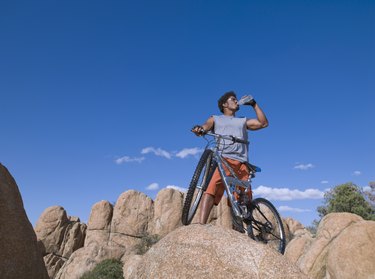
Whether you're skiing in Colorado, mountain biking in Utah, trekking in Nepal or hiking through Denali National Park, you need to drink a lot of water at high altitude compared to what you would normally drink at lower levels. Drinking too little water can quickly lead to dehydration at altitudes above 5,000 feet.
Defining High Altitude
Video of the Day
The International Society for Mountain Medicine defines high altitude as between 5,000 and 11,500 feet, very high altitude as between 11,500 and 18,000 feet, and extreme altitude as any height above that. The higher you go, the greater the effects on your body and the more important it is to stay hydrated.
Video of the Day
Effects of Altitude
Humidity is lower at higher altitudes. Sweat evaporates quickly and you may not realize how much water you are losing through exertion. The lower oxygen levels also make you breathe in and out faster and more deeply, so that you lose more water through respiration. According to the Wilderness Medical Society, you lose water through respiration at high altitude twice as quickly as you do at sea level. High altitude can also make you need to urinate more often and can blunt your thirst response, putting you at even greater risk of dehydration.
Dehydration and Altitude Sickness
Not only is dehydration risky on its own, but it can mask or worsen the symptoms of altitude sickness, a potentially life-threatening condition that can affect some people at altitudes higher than 8,000 feet. Dehydration and altitude sickness can both cause nausea, headaches and fatigue. Drinking a lot of water does not help prevent or alleviate altitude sickness. The only cure for altitude sickness is to descend to a lower altitude.
How Much Water to Drink
According to the Institute for Altitude Medicine, plan to drink an extra 1 to 1.5 liters of water daily when at high altitude. At altitudes above 10,000 feet, you may also need to increase your intake of carbohydrates, so the Wilderness Medical Society recommends drinking a total of 3 to 4 liters daily of liquids containing 200 to 300 grams of carbohydrate. While it is important to drink enough water, drinking too much can be dangerous because it can dilute your body's sodium levels, leading to weakness, confusion and seizures, according to the IAM. A good way to check if you're well-hydrated is to check your urine. If your urine is dark rather than clear, you are dehydrated and need to drink more.